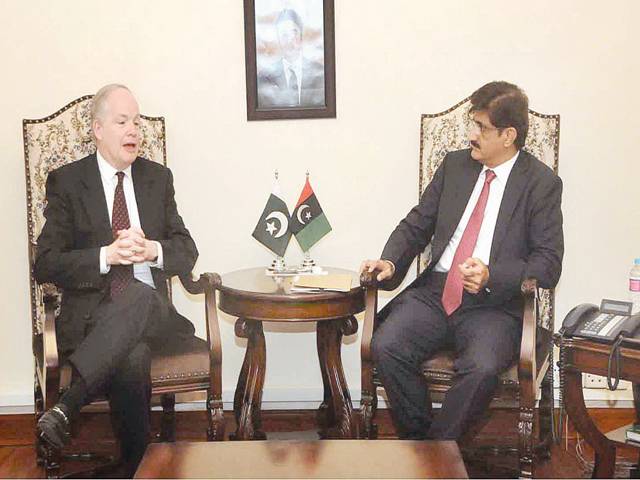Karachi - Sindh Chief Minister Syed Murad Ali Shah has applauded USAID for its support for people of Sindh through a range of progammes focusing on energy, economic growth, agriculture, education and health sectors. He was talking to a delegation of USAID, led by its Mission Director John Groarke, which met him here at the CM House on Monday.
It is pertinent to mention here that the USAID has launched $66 million worth Sindh Municipal Services Programme (MSP), aimed at improving the municipal infrastructure and services in northern Sindh.
The MSP’s centerpiece is Jacobabad Municipal Project, under which the infrastructure relating to water, sanitation and solid waste would be upgraded. MSP is expected to deliver clean drinking water to more than 250,000 people.
USAID has also been partnering with the United Nation Children’s Fund (UNCF) since 2014 to support MSP through social mobilisation and capacity development initiatives. The CM said that over 80 percent work on Jacobabad project had been completed. He urged the USAID mission director to replicate the same in Johi, Mehra, Shahdadkot and Qambar Ali Khan and added that the original project had also been approved for these five cities.
The mission director said that he would go through the project again, and that the Sindh government would be extended technical support.
Murad also discussed with the visitors the Economic Growth and Agriculture Project, which is aimed at developing the livestock, agriculture and horticulture sectors of Sindh.
The project is designed to increase exports by $265 million, raise income by 20 percent for 16000 producers and create 30,000 jobs.
“This is most important project and my government is giving special attention to its execution,” the CM underscored.
The other project, which came under discussion, was the Wind Energy Project for which USAID has committed $43 million. Under the amount to be provided by USAID, transmission lines would be laid to connect wind projects to the national grid.
On completion, these transmission lines will have the capacity to benefit approximately 2.6 million people. The other projects that were discussed pertained to health and education sectors.
Under the Sindh Basic Education Programme (SBEP), the USAID is providing up to $155 million to increase and sustain student enrolment in schools across seven northern districts of the province and five districts of Karachi.
Under the programme, around 100 new schools would be built and the reading skills of over 200,000 children would be improved.
The programme would also address the issue of malnutrition.
Maternal and Child Health (MCH) programme worth $400 million has been launched in the health sector to support reproductive health and family planning as well as to reduce maternal and child mortality rates in the province. The programme would reach out to 21596 mothers and children.
The Jacobabad Institute of Medical Sciences (JIMS) is a USAID-funded 133-bed hospital, which provides high quality medical services to more than one million people each year.
USA has been supporting JPMC since 1950. The USAID completed the construction of a 60 bed fistula and OB-GYN ward in 2012, which is capable of providing care to 140,000 women and training healthcare professionals every year. The chief minister also discussed with the mission director the Resilience Programme, which is actually a Youth Workforce Development Programme (YWDP), and is aimed at reducing the likelihood of the youth developing extremist instincts by building their resilience.
It is a three-year programme, designed to provide training to 3,600 under-privileged youth, as well as the Youth Employment Project which is aimed at imparting technical skills to more than 13,000 youth.






